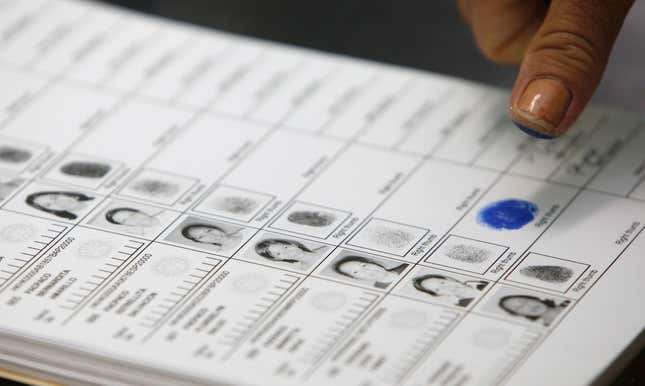Most people celebrate the new year on January 1. Others prefer the moon’s guidance, placing the occasion at various other times. But for legions of accountants, bureaucrats, and other representatives of officialdom, the real new year is July 1, when many companies and some governments reset their fiscal calendars. The date is also seemingly irresistible to those picking an arbitrary point in the future for something to begin or end.
As a result, July 1, 2013, brings with it an unusual amount of change. Here are some of the most significant, oddest, or otherwise notable events happening on Monday.
The Met will ditch its metal admission buttons

Though they have become an iconic symbol of the arts in New York City, the Metropolitan Museum of Art says the tin-plated badges you attach to your clothes—of which it issues over 6 million a year at a cost of about three cents apiece—are too expensive and inflexible to continue serving as its proof of payment. On July 1, the beginning of a new fiscal year, the museum will switch to a system of paper tickets and stickers.
Much of Montreal will move apartments
Most rental agreements in the city begin on July 1, a tradition that dates to the 1700s, “when a requirement to move on a certain, single day was viewed as a way to save tenants from being put out on the streets in the middle of Quebec’s bitter winters.” But with its population now at 1.7 million people, Montreal’s collective move-in date is a logistical nightmare. Moving Day, as it’s known in English, has been lampooned in a movie, Premier juillet, le film (trailer above), and often mocked by the rest of the country, which knows July 1 better as Canada Day, a federal holiday marking the nation’s birth.
Japan will make it easier for neighbors to visit

Japanese legislators, concerned that the country’s relative strict visas are constraining tourism revenue, have made it easier for people from Vietnam, Indonesia, Malaysia, Thailand, and the Philippines to enter the country. The occasion, according to Japan’s foreign ministry, is the 40th anniversary of relations with the Association of Southeast Asian Nations. That may just be an excuse to exclude China: Tourism from China to Japan fell 40% last year amid tension over control of the Senkaku Islands, but both governments have been reluctant to do much about it.
Google will shut down its market-leading RSS reader

Google Reader never achieved mass popularity, but it’s still the most popular tool for those who like to get news from multiple websites using RSS feeds. That will change on July 1, when Google shuts it down because, as it explained a few months ago, “usage of Google Reader has declined, and as a company we’re pouring all of our energy into fewer products.” Vocal power users of the web expressed dismay as they searched for the best alternative.
The interest rate on US student loans will double

College in the United States is about to get more expensive. Because a deal wasn’t reached before Congress adjourned on June 28 for a weeklong holiday, interest rates on student loans backed by the US government will rise from 3.4% to 6.8% on July 1, affecting 7 million people. The government estimates that the average student with such loans will pay $1,000 more. “That’s like a $1,000 tax hike,” president Barack Obama recently said. Lawmakers say they’ll work on a compromise to retroactively lower the interest rate when they get back from vacation.
The Philippines will start requiring fingerprints to vote

A new law going into effect on July 1 will require Filipinos to have a photo, fingerprint, and signature on file with the government in order to vote. The election commission estimates that 9 million registered voters will have to update their records or risk being shut out of the 2016 presidential election.
Gay couples in Delaware will be able to marry

Most states in the US have fiscal calendars that begin on July 1, so many state laws take effect on that day, as well. The most significant this year is probably Delaware’s legalization of same-sex marriage. Only one gay couple will get hitched on Monday, though, because the state normally requires all residents to wait 24 hours after applying for a marriage license. The waiting period was waived for state senator Karen Peterson and her partner, Vikki Bandy, who will turn their civil union into a legal marriage on the morning of July 1. They and other married gay couples in Delaware will now also enjoy the same federal benefits—from tax breaks to citizenship-via-marriage—as heterosexual couples, thanks to last week’s US Supreme Court ruling that struck down the Defense of Marriage Act.
Hong Kongers will take to the streets

The United Kingdom formally transferred sovereignty of Hong Kong to China on July 1, 1997, known cumbersomely in English as Hong Kong Special Administrative Region Establishment Day. Residents of the city-state mark the occasion with protests, which have grown larger in recent years. This year, the focus will be on Hong Kong chief executive Leung Chun-ying, whose administration has suffered from a series of scandals (paywall). Why was Hong Kong’s sovereignty passed on July 1? The expiration of a 99-year lease that began on July 1, 1898, because it was the start of a month.
American truckers will have to take more breaks

New regulations governing the US trucking industry go into effect on July 1. The most significant change to so-called “hours of service” provisions will require truckers to take a 30-minute break if the driver has been on the road for eight consecutive hours. The change, opposed by trucking companies, is intended to curb crashes caused by driver fatigue.
Indian accountants will have their day to party

It’s only appropriate that Chartered Accountants Day is celebrated in India on July 1, the start of many fiscal years. It marks the start of new laws in 1949 governing the registration of accountants in the new country. The Institute of Chartered Accountants of India will celebrate this year by issuing new guidance on conducting income tax audits, which is the only way accountants know how to party.
Former Soviet states acknowledge the toil of their officials

In the Soviet Union virtually every day on the calendar (link in Russian) was a worker’s holiday of some sort—Submariner’s Day (March 19), Philologist’s Day (May 25), Border Policeman’s Day (May 28), and so on. The post-Soviet states have continued to cook up commemorations with abandon, with the result that the calendar is now full to bursting: Computer programmers in Russia must share their special day, Sept. 13, with hairdressers. As for July 1, it’s Architect’s Day in Ukraine, Prosecutor’s Day in Armenia, and Tax Inspector’s Day in Kazakhstan. It’s also the sinisterly-named “Day of Voluntary Entry [read: forced annexation] of Buryatia into the Russian State.” The Siberian republic marked the 350th anniversary of the happy event two years ago.
McGruff the Crime Dog will celebrate his birthday

The semi-official mascot of crime prevention in the United States, McGruff turns 33 on July 1. He was introduced in television ads by the National Crime Prevention Council in 1980 along with his slogan, “Take a bite out of crime.”
